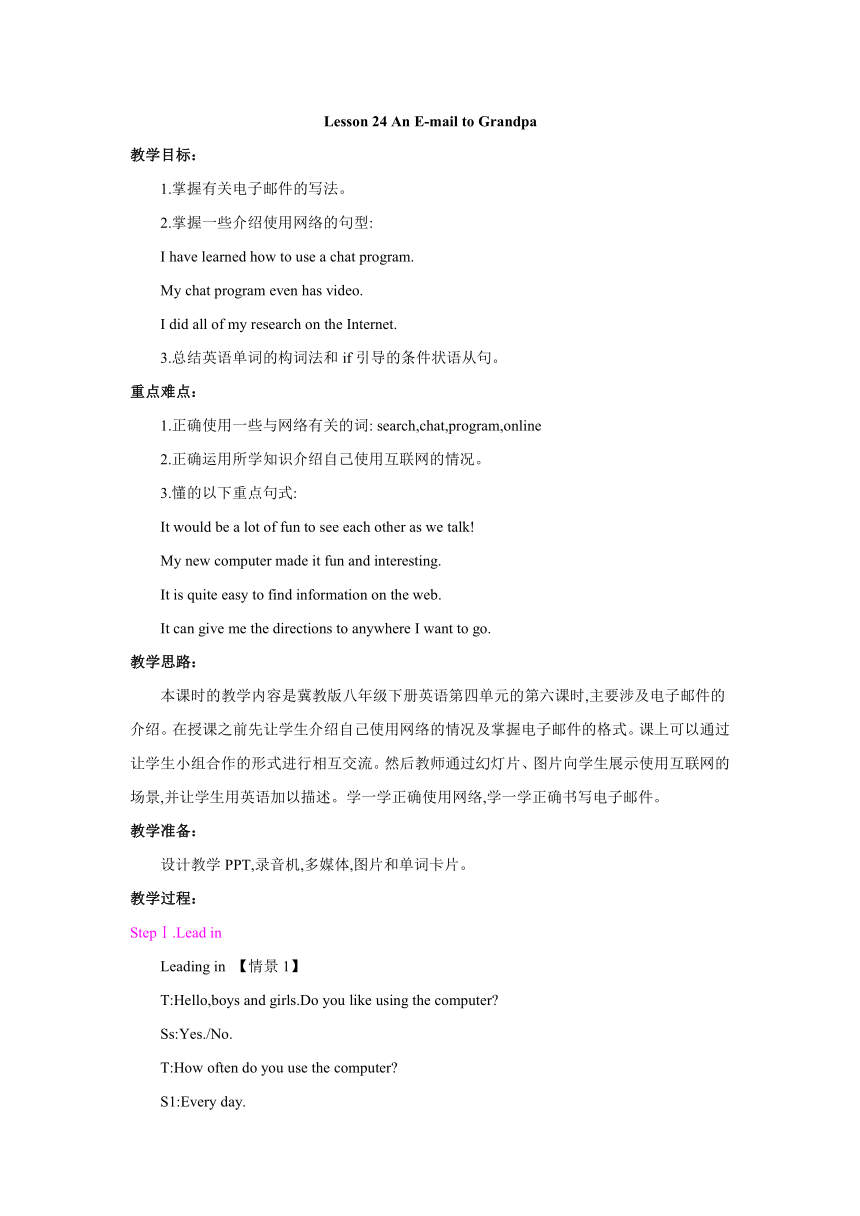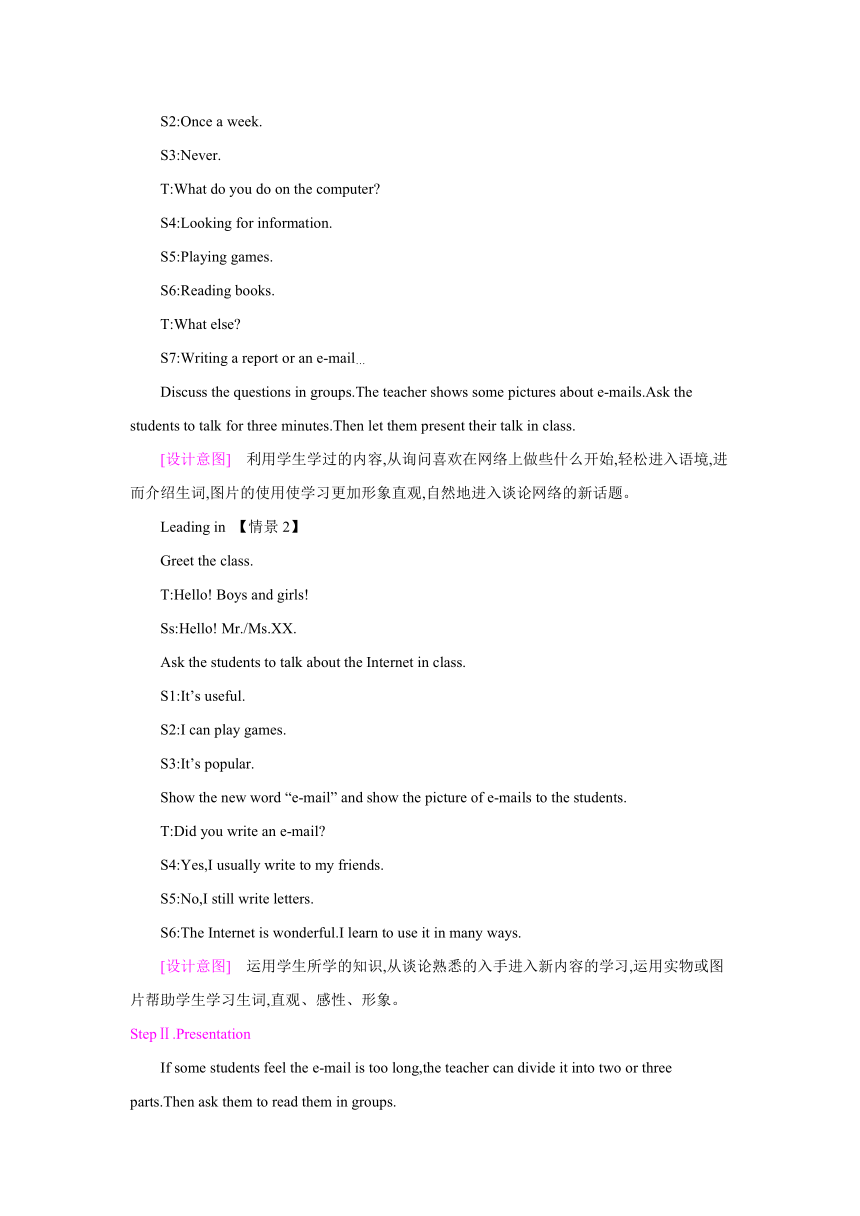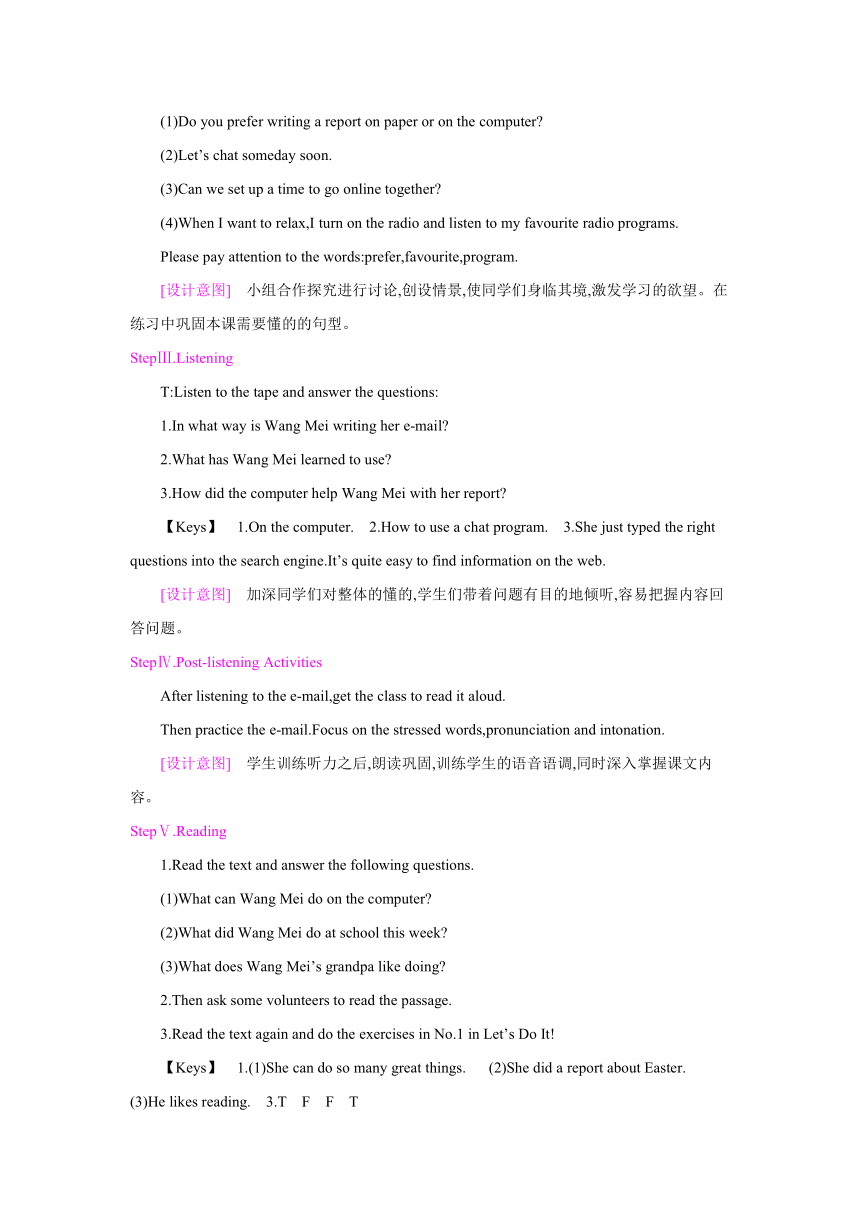Lesson 24 An E-mail to Grandpa 教学设计
文档属性
| 名称 | Lesson 24 An E-mail to Grandpa 教学设计 |

|
|
| 格式 | zip | ||
| 文件大小 | 28.0KB | ||
| 资源类型 | 教案 | ||
| 版本资源 | 冀教版 | ||
| 科目 | 英语 | ||
| 更新时间 | 2019-06-28 13:56:37 | ||
图片预览




文档简介
Lesson 24 An E-mail to Grandpa
教学目标:
1.掌握有关电子邮件的写法。
2.掌握一些介绍使用网络的句型:
I have learned how to use a chat program.
My chat program even has video.
I did all of my research on the Internet.
3.总结英语单词的构词法和if引导的条件状语从句。
重点难点:
1.正确使用一些与网络有关的词: search,chat,program,online
2.正确运用所学知识介绍自己使用互联网的情况。
3.懂的以下重点句式:
It would be a lot of fun to see each other as we talk!
My new computer made it fun and interesting.
It is quite easy to find information on the web.
It can give me the directions to anywhere I want to go.
教学思路:
本课时的教学内容是冀教版八年级下册英语第四单元的第六课时,主要涉及电子邮件的介绍。在授课之前先让学生介绍自己使用网络的情况及掌握电子邮件的格式。课上可以通过让学生小组合作的形式进行相互交流。然后教师通过幻灯片、图片向学生展示使用互联网的场景,并让学生用英语加以描述。学一学正确使用网络,学一学正确书写电子邮件。
教学准备:
设计教学PPT,录音机,多媒体,图片和单词卡片。
教学过程:
StepⅠ.Lead in
Leading in 【情景1】
T:Hello,boys and girls.Do you like using the computer?
Ss:Yes./No.
T:How often do you use the computer?
S1:Every day.
S2:Once a week.
S3:Never.
T:What do you do on the computer?
S4:Looking for information.
S5:Playing games.
S6:Reading books.
T:What else?
S7:Writing a report or an e-mail…
Discuss the questions in groups.The teacher shows some pictures about e-mails.Ask the students to talk for three minutes.Then let them present their talk in class.
[设计意图] 利用学生学过的内容,从询问喜欢在网络上做些什么开始,轻松进入语境,进而介绍生词,图片的使用使学习更加形象直观,自然地进入谈论网络的新话题。
Leading in 【情景2】
Greet the class.
T:Hello! Boys and girls!
Ss:Hello! Mr./Ms.XX.
Ask the students to talk about the Internet in class.
S1:It’s useful.
S2:I can play games.
S3:It’s popular.
Show the new word “e-mail” and show the picture of e-mails to the students.
T:Did you write an e-mail?
S4:Yes,I usually write to my friends.
S5:No,I still write letters.
S6:The Internet is wonderful.I learn to use it in many ways.
[设计意图] 运用学生所学的知识,从谈论熟悉的入手进入新内容的学习,运用实物或图片帮助学生学习生词,直观、感性、形象。
StepⅡ.Presentation
If some students feel the e-mail is too long,the teacher can divide it into two or three parts.Then ask them to read them in groups.
(1)Do you prefer writing a report on paper or on the computer?
(2)Let’s chat someday soon.
(3)Can we set up a time to go online together?
(4)When I want to relax,I turn on the radio and listen to my favourite radio programs.
Please pay attention to the words:prefer,favourite,program.
[设计意图] 小组合作探究进行讨论,创设情景,使同学们身临其境,激发学习的欲望。在练习中巩固本课需要懂的的句型。
StepⅢ.Listening
T:Listen to the tape and answer the questions:
1.In what way is Wang Mei writing her e-mail?
2.What has Wang Mei learned to use?
3.How did the computer help Wang Mei with her report?
【Keys】 1.On the computer. 2.How to use a chat program. 3.She just typed the right questions into the search engine.It’s quite easy to find information on the web.
[设计意图] 加深同学们对整体的懂的,学生们带着问题有目的地倾听,容易把握内容回答问题。
StepⅣ.Post-listening Activities
After listening to the e-mail,get the class to read it aloud.
Then practice the e-mail.Focus on the stressed words,pronunciation and intonation.
[设计意图] 学生训练听力之后,朗读巩固,训练学生的语音语调,同时深入掌握课文内容。
StepⅤ.Reading
1.Read the text and answer the following questions.
(1)What can Wang Mei do on the computer?
(2)What did Wang Mei do at school this week?
(3)What does Wang Mei’s grandpa like doing?
2.Then ask some volunteers to read the passage.
3.Read the text again and do the exercises in No.1 in Let’s Do It!
【Keys】 1.(1)She can do so many great things. (2)She did a report about Easter. (3)He likes reading. 3.T F F T
☆教材解读☆
1.Do you prefer writing a report on paper or on the computer? ?
prefer doing sth意思是 “更喜欢做什么,偏爱什么”,其中prefer 表示“更喜欢”,不可以用于现在进行时态。
My mother prefers raising fishes.
我妈妈更喜欢养鱼。
【拓展】 prefer 的其他用法:
(1)prefer sth更喜欢某物。
I prefer apples.我更喜欢苹果。
(2)prefer that…希望……。
He prefers that he can pass the exam.
他希望他能通过考试。
(3)prefer…to…比起……更喜欢……。
She prefers basketball to baseball.
比起棒球,她更喜欢篮球。
(4)prefer to do sth rather than do sth 宁愿做某事而不愿做某事。
We prefer to swim rather than climb the mountains.我们宁愿游泳也不愿去爬山。
2.Let’s chat someday soon.?
句中someday是不定代词,意思是“某天”,等于some day,一般用于将来时态。
He wants to go to Beijing someday.
有朝一日,他想去北京。
【辨析】 someday,one day,the other day
(1)someday“将来的某一天”,只可以表示将来,不表示过去。
I want to travel all over the world someday.我希望有一天游遍全世界。
(2)one day“有一天”, 既可以表示将来,也可以表示过去。
You’ll thank me one day.
有一天你会感谢我的。
(3)the other day“不久前的某一天”,表示说话前不久的日子。
They went fishing the other day.
前几天他们钓鱼去了。
3.Can we set up a time to go online together? ?
句中set up a time的意思是“约定一个时间”,其中 set up意思是“约定”。
They set up a time to play soccer.
他们约时间去踢足球。
【拓展】 set up 还可以表示“建立,开办”,后面常接一些机构或者组织等。
Volunteers set up a fund for hungry children.志愿者们为饥饿的孩子们建立了基金。
4.When I want to relax,I turn on the radio and listen to my favourite radio programs.?
句中turn on 意思是“打开”,指的是打开电灯或者电视一类的电器等,与其意义相反的短语是turn off,意思是“关掉”。它还可以表示打开自来水、煤气罐等。
Don’t turn on the TV.You should do your homework.不要开电视。你应该做作业。
Please turn off the TV.The baby is sleeping.请关上电视。宝宝正在睡觉。
【拓展】 turn down 意思是“关小点,调低点”,通常表示把收音机或者电视等电器的声音调小或者调低,与其相反意义的短语是turn up,意思是“开大一点,调高点”。
Turn down the TV.It’s too noisy.
把电视声音关小。太吵了。
Turn up the tape player so that all the students can hear clearly.把录音机声音调大点,以便所有学生能听到。
【注意】 turn on,turn off,turn up,turn down都是动副结构短语,若宾语是名词,既可以放后面,也可以放在两个词中间。若宾语是代词,只能放在两词中间。
[设计意图] 学生通过阅读课文内容,掌握课文重点内容,并且通过回答问题来巩固对课文的理解和懂的;朗读课文并完成练习题1,掌握课文重点内容。
StepⅥ.Complete Let’s Do It!
Ask the students to listen to the tape and finish No.1 and read the e-mail carefully to fill in the blanks in No.2 by themselves.
[设计意图] Let’s Do It! 部分中的No.1重点是听力训练教学,针对课文内容,以听力的方式进行训练。既巩固了课文,又培养了学生的听力能力。No.2训练文中出现的重点单词和短语知识,让学生对基础知识有着细致深刻的掌握。
StepⅦ.Task
GROUP WORK:Let’s Do It! No.3,No.4
Ask students in groups to come to the front of the classroom,and they can present their ideas about e-mails.
[设计意图] No.3,No.4的重点是实践练习,同学们通过小组合作来完成。以“网络交流”为话题,提供了一个语境完整、内容丰富的话题,自然呈现本单元的核心句型,为学生进一步输出语言提供了口语示范。
StepⅧ.Exercises
T:Now,look at the sentences with some missing words.Please use proper words to fill them.
1.She (更喜欢弹) the guitar.?
2.Maybe we will live in the sea (将来某一天).?
3.They can (安排) the sports meeting.?
4.My father (打开) the TV at seven o’clock every day.?
5.The children (玩得开心) flying kites.?
【Keys】 1.prefers playing 2.someday 3.set up 4.turns on 5.had fun
[设计意图] 以学评教、强化落实。当堂检测主要是由本节内容组成的形成性评价,利用已知的信息,让学生补充,让他们得到充分的训练。
StepⅨ.Homework
1.Practice the e-mail with your group members after class.
2.Copy the new words twice.
[设计意图] 口头练习和单词记忆相结合,复习、归纳,注重语言知识的操练与积累。
Lesson 24 An E-mail to Grandpa
search,chat,program,online
I have learned how to use a chat program.
My chat program even has video.
I did all of my research on the Internet.
It would be a lot of fun to see each other as we talk!
My new computer made it fun and interesting.
It is quite easy to find information on the web.
It can give me the directions to anywhere I want to go.
教材习题答案
【Lesson 24】
2 1.chatting 2.set up 3.search 4.program 5.go online
【Unit Review】
Building Your Vocabulary
Ⅰ.1.keyboard 2.hid 3.appeared 4.industry 5.receive
Ⅱ.1.write down 2.depend on 3.be afraid 4.take over 5.set up
Gramma in Use
1.If you know how to use the computer,you can write your report on it.
2.If you know another program,you can edit your passage more easily than before.
3.If you are careful on the Internet,it will make your life richer and easier.
4.If you spend too much time online,it will hurt your family and friendships.
Putting It All Together
1.F 2.F 3.T 4.T
语法精讲
if引导的条件状语从句
引导条件状语从句最常用的连词是if,常见的if条件状语从句表示在某条件下,某事很可能发生,条件是可能存在的,主句中某种情况发生的概率也是很高的。
If you ask him,he will help you.
如果你请求他,他会帮你的。
If you fail in the exam,you will let him down.
如果你考试不及格,你会让他失望的。
If you finish the homework,you can go home.
如果你完成了家庭作业就可以回家了。
1.if引导的条件状语从句的构成。
构成:“主句+if引导的条件状语从句”或“if引导的条件状语从句+主句”。在含有条件状语从句的复合句中,如果主句在前,从句在后,主从句之间不用标点;如果要强调从句的内容,则把从句放在主句的前面,这时主从句之间要用逗号隔开。
I will go to his birthday party if he invites me.
=If he invites me,I will go to his birthday party.如果他邀请我,我将去他的生日宴会。
2.if引导的条件状语从句的时态。
在一般情况下,如果主句谓语动词表示将来的意义,从句谓语动词用一般现在时表示将来。常见的有以下几种:
(1)主句是一般将来时。
You will be late for school if you get up late.
如果你起晚了,上学将会迟到。
If it rains tomorrow,we won’t go to the Great Wall.如果明天下雨,我们就不去长城。
(2)主句的谓语动词是want,hope,wish等词。
I hope to visit her if I’m free.
如果我有空,我希望去拜访她。
(3)主句的谓语动词含can,may,must等情态动词。
If I finish my homework,I can watch TV.
如果我完成了我的家庭作业,就可以看电视。
(4)主句是祈使句。
Don’t forget to lock the door if you are the last one to leave.如果你最后一个离开,别忘了锁门。
教学目标:
1.掌握有关电子邮件的写法。
2.掌握一些介绍使用网络的句型:
I have learned how to use a chat program.
My chat program even has video.
I did all of my research on the Internet.
3.总结英语单词的构词法和if引导的条件状语从句。
重点难点:
1.正确使用一些与网络有关的词: search,chat,program,online
2.正确运用所学知识介绍自己使用互联网的情况。
3.懂的以下重点句式:
It would be a lot of fun to see each other as we talk!
My new computer made it fun and interesting.
It is quite easy to find information on the web.
It can give me the directions to anywhere I want to go.
教学思路:
本课时的教学内容是冀教版八年级下册英语第四单元的第六课时,主要涉及电子邮件的介绍。在授课之前先让学生介绍自己使用网络的情况及掌握电子邮件的格式。课上可以通过让学生小组合作的形式进行相互交流。然后教师通过幻灯片、图片向学生展示使用互联网的场景,并让学生用英语加以描述。学一学正确使用网络,学一学正确书写电子邮件。
教学准备:
设计教学PPT,录音机,多媒体,图片和单词卡片。
教学过程:
StepⅠ.Lead in
Leading in 【情景1】
T:Hello,boys and girls.Do you like using the computer?
Ss:Yes./No.
T:How often do you use the computer?
S1:Every day.
S2:Once a week.
S3:Never.
T:What do you do on the computer?
S4:Looking for information.
S5:Playing games.
S6:Reading books.
T:What else?
S7:Writing a report or an e-mail…
Discuss the questions in groups.The teacher shows some pictures about e-mails.Ask the students to talk for three minutes.Then let them present their talk in class.
[设计意图] 利用学生学过的内容,从询问喜欢在网络上做些什么开始,轻松进入语境,进而介绍生词,图片的使用使学习更加形象直观,自然地进入谈论网络的新话题。
Leading in 【情景2】
Greet the class.
T:Hello! Boys and girls!
Ss:Hello! Mr./Ms.XX.
Ask the students to talk about the Internet in class.
S1:It’s useful.
S2:I can play games.
S3:It’s popular.
Show the new word “e-mail” and show the picture of e-mails to the students.
T:Did you write an e-mail?
S4:Yes,I usually write to my friends.
S5:No,I still write letters.
S6:The Internet is wonderful.I learn to use it in many ways.
[设计意图] 运用学生所学的知识,从谈论熟悉的入手进入新内容的学习,运用实物或图片帮助学生学习生词,直观、感性、形象。
StepⅡ.Presentation
If some students feel the e-mail is too long,the teacher can divide it into two or three parts.Then ask them to read them in groups.
(1)Do you prefer writing a report on paper or on the computer?
(2)Let’s chat someday soon.
(3)Can we set up a time to go online together?
(4)When I want to relax,I turn on the radio and listen to my favourite radio programs.
Please pay attention to the words:prefer,favourite,program.
[设计意图] 小组合作探究进行讨论,创设情景,使同学们身临其境,激发学习的欲望。在练习中巩固本课需要懂的的句型。
StepⅢ.Listening
T:Listen to the tape and answer the questions:
1.In what way is Wang Mei writing her e-mail?
2.What has Wang Mei learned to use?
3.How did the computer help Wang Mei with her report?
【Keys】 1.On the computer. 2.How to use a chat program. 3.She just typed the right questions into the search engine.It’s quite easy to find information on the web.
[设计意图] 加深同学们对整体的懂的,学生们带着问题有目的地倾听,容易把握内容回答问题。
StepⅣ.Post-listening Activities
After listening to the e-mail,get the class to read it aloud.
Then practice the e-mail.Focus on the stressed words,pronunciation and intonation.
[设计意图] 学生训练听力之后,朗读巩固,训练学生的语音语调,同时深入掌握课文内容。
StepⅤ.Reading
1.Read the text and answer the following questions.
(1)What can Wang Mei do on the computer?
(2)What did Wang Mei do at school this week?
(3)What does Wang Mei’s grandpa like doing?
2.Then ask some volunteers to read the passage.
3.Read the text again and do the exercises in No.1 in Let’s Do It!
【Keys】 1.(1)She can do so many great things. (2)She did a report about Easter. (3)He likes reading. 3.T F F T
☆教材解读☆
1.Do you prefer writing a report on paper or on the computer? ?
prefer doing sth意思是 “更喜欢做什么,偏爱什么”,其中prefer 表示“更喜欢”,不可以用于现在进行时态。
My mother prefers raising fishes.
我妈妈更喜欢养鱼。
【拓展】 prefer 的其他用法:
(1)prefer sth更喜欢某物。
I prefer apples.我更喜欢苹果。
(2)prefer that…希望……。
He prefers that he can pass the exam.
他希望他能通过考试。
(3)prefer…to…比起……更喜欢……。
She prefers basketball to baseball.
比起棒球,她更喜欢篮球。
(4)prefer to do sth rather than do sth 宁愿做某事而不愿做某事。
We prefer to swim rather than climb the mountains.我们宁愿游泳也不愿去爬山。
2.Let’s chat someday soon.?
句中someday是不定代词,意思是“某天”,等于some day,一般用于将来时态。
He wants to go to Beijing someday.
有朝一日,他想去北京。
【辨析】 someday,one day,the other day
(1)someday“将来的某一天”,只可以表示将来,不表示过去。
I want to travel all over the world someday.我希望有一天游遍全世界。
(2)one day“有一天”, 既可以表示将来,也可以表示过去。
You’ll thank me one day.
有一天你会感谢我的。
(3)the other day“不久前的某一天”,表示说话前不久的日子。
They went fishing the other day.
前几天他们钓鱼去了。
3.Can we set up a time to go online together? ?
句中set up a time的意思是“约定一个时间”,其中 set up意思是“约定”。
They set up a time to play soccer.
他们约时间去踢足球。
【拓展】 set up 还可以表示“建立,开办”,后面常接一些机构或者组织等。
Volunteers set up a fund for hungry children.志愿者们为饥饿的孩子们建立了基金。
4.When I want to relax,I turn on the radio and listen to my favourite radio programs.?
句中turn on 意思是“打开”,指的是打开电灯或者电视一类的电器等,与其意义相反的短语是turn off,意思是“关掉”。它还可以表示打开自来水、煤气罐等。
Don’t turn on the TV.You should do your homework.不要开电视。你应该做作业。
Please turn off the TV.The baby is sleeping.请关上电视。宝宝正在睡觉。
【拓展】 turn down 意思是“关小点,调低点”,通常表示把收音机或者电视等电器的声音调小或者调低,与其相反意义的短语是turn up,意思是“开大一点,调高点”。
Turn down the TV.It’s too noisy.
把电视声音关小。太吵了。
Turn up the tape player so that all the students can hear clearly.把录音机声音调大点,以便所有学生能听到。
【注意】 turn on,turn off,turn up,turn down都是动副结构短语,若宾语是名词,既可以放后面,也可以放在两个词中间。若宾语是代词,只能放在两词中间。
[设计意图] 学生通过阅读课文内容,掌握课文重点内容,并且通过回答问题来巩固对课文的理解和懂的;朗读课文并完成练习题1,掌握课文重点内容。
StepⅥ.Complete Let’s Do It!
Ask the students to listen to the tape and finish No.1 and read the e-mail carefully to fill in the blanks in No.2 by themselves.
[设计意图] Let’s Do It! 部分中的No.1重点是听力训练教学,针对课文内容,以听力的方式进行训练。既巩固了课文,又培养了学生的听力能力。No.2训练文中出现的重点单词和短语知识,让学生对基础知识有着细致深刻的掌握。
StepⅦ.Task
GROUP WORK:Let’s Do It! No.3,No.4
Ask students in groups to come to the front of the classroom,and they can present their ideas about e-mails.
[设计意图] No.3,No.4的重点是实践练习,同学们通过小组合作来完成。以“网络交流”为话题,提供了一个语境完整、内容丰富的话题,自然呈现本单元的核心句型,为学生进一步输出语言提供了口语示范。
StepⅧ.Exercises
T:Now,look at the sentences with some missing words.Please use proper words to fill them.
1.She (更喜欢弹) the guitar.?
2.Maybe we will live in the sea (将来某一天).?
3.They can (安排) the sports meeting.?
4.My father (打开) the TV at seven o’clock every day.?
5.The children (玩得开心) flying kites.?
【Keys】 1.prefers playing 2.someday 3.set up 4.turns on 5.had fun
[设计意图] 以学评教、强化落实。当堂检测主要是由本节内容组成的形成性评价,利用已知的信息,让学生补充,让他们得到充分的训练。
StepⅨ.Homework
1.Practice the e-mail with your group members after class.
2.Copy the new words twice.
[设计意图] 口头练习和单词记忆相结合,复习、归纳,注重语言知识的操练与积累。
Lesson 24 An E-mail to Grandpa
search,chat,program,online
I have learned how to use a chat program.
My chat program even has video.
I did all of my research on the Internet.
It would be a lot of fun to see each other as we talk!
My new computer made it fun and interesting.
It is quite easy to find information on the web.
It can give me the directions to anywhere I want to go.
教材习题答案
【Lesson 24】
2 1.chatting 2.set up 3.search 4.program 5.go online
【Unit Review】
Building Your Vocabulary
Ⅰ.1.keyboard 2.hid 3.appeared 4.industry 5.receive
Ⅱ.1.write down 2.depend on 3.be afraid 4.take over 5.set up
Gramma in Use
1.If you know how to use the computer,you can write your report on it.
2.If you know another program,you can edit your passage more easily than before.
3.If you are careful on the Internet,it will make your life richer and easier.
4.If you spend too much time online,it will hurt your family and friendships.
Putting It All Together
1.F 2.F 3.T 4.T
语法精讲
if引导的条件状语从句
引导条件状语从句最常用的连词是if,常见的if条件状语从句表示在某条件下,某事很可能发生,条件是可能存在的,主句中某种情况发生的概率也是很高的。
If you ask him,he will help you.
如果你请求他,他会帮你的。
If you fail in the exam,you will let him down.
如果你考试不及格,你会让他失望的。
If you finish the homework,you can go home.
如果你完成了家庭作业就可以回家了。
1.if引导的条件状语从句的构成。
构成:“主句+if引导的条件状语从句”或“if引导的条件状语从句+主句”。在含有条件状语从句的复合句中,如果主句在前,从句在后,主从句之间不用标点;如果要强调从句的内容,则把从句放在主句的前面,这时主从句之间要用逗号隔开。
I will go to his birthday party if he invites me.
=If he invites me,I will go to his birthday party.如果他邀请我,我将去他的生日宴会。
2.if引导的条件状语从句的时态。
在一般情况下,如果主句谓语动词表示将来的意义,从句谓语动词用一般现在时表示将来。常见的有以下几种:
(1)主句是一般将来时。
You will be late for school if you get up late.
如果你起晚了,上学将会迟到。
If it rains tomorrow,we won’t go to the Great Wall.如果明天下雨,我们就不去长城。
(2)主句的谓语动词是want,hope,wish等词。
I hope to visit her if I’m free.
如果我有空,我希望去拜访她。
(3)主句的谓语动词含can,may,must等情态动词。
If I finish my homework,I can watch TV.
如果我完成了我的家庭作业,就可以看电视。
(4)主句是祈使句。
Don’t forget to lock the door if you are the last one to leave.如果你最后一个离开,别忘了锁门。
同课章节目录
- Unit 1 Spring Is Coming
- Lesson 1 How's the weather?
- Lesson 2 It's Getting Warmer!
- Lesson 3 Sun Is Rising
- Lesson 4 The Spring City
- Lesson 5 Babysitting on a Spring Day
- Lesson 6 Stories about Spring
- Unit 2 Plant a Plant
- Lesson 7 Planting Trees
- Lesson 8 Why Are Plants Important?
- Lesson 9 Gardening with Mary
- Lesson 10 Make Your Garden Grow!
- Lesson 11 Amazing Plants
- Lesson 12 Danny's Plant
- Unit 3 Animals Are Our Friends
- Lesson 13 Danny's Big Scare
- Lesson 14 Amazing Animals
- Lesson 15 The Zoo Is Open
- Lesson 16 The Pear Escaped
- Lesson 17 Save the Tigers
- Lesson 18 Friendship Between Animals
- Unit 4 The Internet Connects Us
- Lesson 19 How Do You Use the Internet?
- Lesson 20 A Computer Helps!
- Lesson 21 Books or Computers?
- Lesson 22 Travel on the Internet
- Lesson 23 The Internet--Good or Bad?
- Lesson 24 An E-mail to Grandpa
- Unit 5 Buying and Selling
- Lesson 25 Raising Money
- Lesson 26 Cookies, Please!
- Lesson 27 Business English
- Lesson 28 Ms. Liu's Great Idea
- Lesson 29 How to Push a Product
- Lesson 30 A Cookie Sale
- Unit 6 Be a Champion!
- Lesson 31 Don't Fall, Danny
- Lesson 32 My Favourite Record
- Lesson 33 2800 Years of Sports
- Lesson 34 Modern Olympics
- Lesson 35 The Dream Team
- Lesson 36 Classroom Olympics
- Unit 7 Know Our World
- Lesson 37 Let's Learn Geography!
- Lesson 38 The World Is a Big Place
- Lesson 39 Ring Up or Call?
- Lesson 40 Body Language
- Lesson 41 A Class of the World
- Lesson 42 North America
- Unit 8 Save Our World
- Lesson 43 Let's Clean Up!
- Lesson 44 Environment Clubs
- Lesson 45 Let's Sort Garbage!
- Lesson 46 Protect Our Environment
- Lesson 47 Connected to Nature
- Lesson 48 Garbage Is Interesting!
